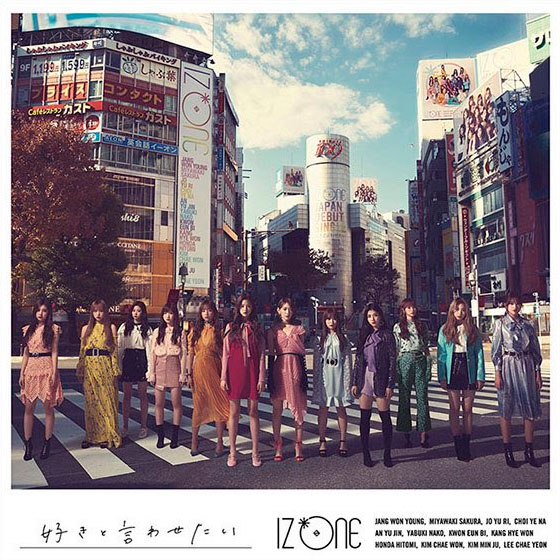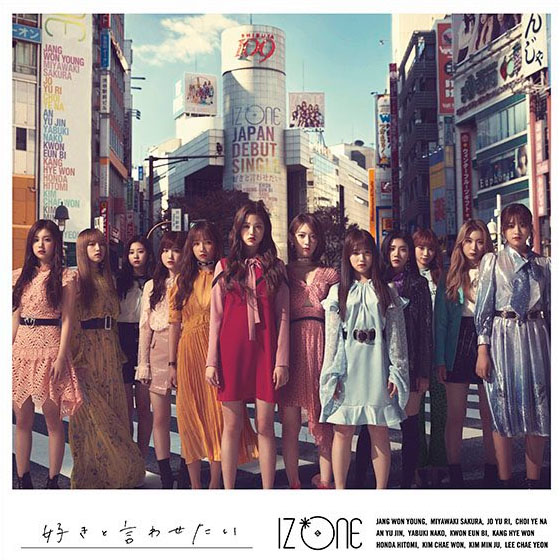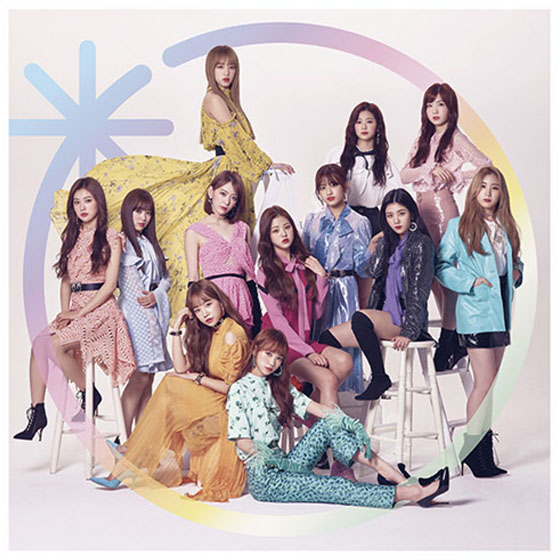
Type A
- Suki to Iwasetai (好きと言わせたい)
- Kenchanayo(ケンチャナヨ)
- Gokigen Sayonara (ご機嫌サヨナラ)
- Suki to Iwasetai (Instrumental)
- Gwaenchanhayo (Instrumental)
- Gokigen Sayonara (Instrumental)

Type B
- Suki to Iwasetai (好きと言わせたい)
- Kenchanayo(ケンチャナヨ)
- Neko ni Naritai (猫になりたい)
- Suki to Iwasetai (Instrumental)
- Gwaenchanhayo (Instrumental)
- Neko ni Naritai (Instrumental)

WIZ*ONE Edition
- Suki to Iwasetai (好きと言わせたい)
- Kenchanayo(ケンチャナヨ)
- Dance wo Omoidasu Made (ダンスを思い出すまで)
- Suki to Iwasetai (Instrumental)
- Gwaenchanhayo (Instrumental)
- Dance wo Omoidasu Made (Instrumental)
DVD Tracklist
- Suki to Iwasetai Music Video
- Gokigen Sayonara Music Video (Regular Edition A)
- Neko ni Naritai Music Video (Regular Edition B)
Release Date: February 6, 2019
Review
Suki to Iwasetai is IZ*ONE’s debut Japanese single and it comes in 16 editions.
- 2 regular editions that come with an application for a special message card delivery
- limited WIZ*ONE edition sold on IZ*ONE’s Official Japan shop that comes with a photo and event participation ticket
- 12 member specific solo jacket editions that come with a photo
- A CD box set that includes the WIZ*ONE edition and all members editions with individual signatures
Well IZ*ONE are certainly trying to make a splash for their first foray into Japan. 16 editions seems a little excessive for 5 new songs. But the perks that come with each edition appear to be enough to offset the cost of collecting each version. A FYI for those with the cash to burn. You are looking at roughly around $180 (maybe more depending on yen conversion to local currency plus shipping & handling) to get every edition and the goodies that come with them.
The question with this single is do you get any real value out of the hole burned in your wallet from purchasing whatever edition(s) are available? In other words, are the songs contained on this single any good?
Let’s get one thing out of the way before we start into that. Comparing this release to the monster that was their Korean mini-album COLOR*IZ is unfair. That is an example of the famous idiom of comparing apples to oranges.
Given that IZ*ONE are appealing to the Japanese market this time around there are different qualifiers that will make the music contained on this single hits within Japan. So it should be no surprise to anyone who has followed the progress of this group from their beginnings that Suki to Iwasetai is going to be a complete 180 from their Korean debut.
With that in mind the one thing that is immediately noticeable is there are no Japanese versions of songs from COLORIZ or the original songs created during the Produce 48 series that were in Korean. Instead IZONE are free of re-hashing past glories and are given a clean slate with fresh music to try and make an impact in the world of J-Pop.
The a-side, Suki to Iwasetai is a rather pleasant introduction to the J-Pop version of IZ*ONE. Even though it is an up tempo song it does not rely on overpowering the listener with pounding beats. There is a reliance on the type of instrumentation and lyrical content that made early Keyakizaka46 and a lot of Nogizaka46’s songs successful.
That aspect is present throughout the entire single package in one way or another. One cannot help but feel the spiritual force of the Sakamichi series. Whether that entices you to further invest in listening past the a-side will depend on your tolerance for the 46 brand of Akimoto Yasushi produced idol groups.
The b-sides offer the more noteworthy listens. Each one displays a wider variety of musical styles for the group to work within. Type A’s Gokigen Sayonara and Type B’s Neko ni Naritai are the ones that stand out the most.The former is a bubbly tune whose musical backdrop belies the fact that it is a break up song. It is incredibly catchy and carries hints of some of the idol music that Taku Takahashi produces every few moons or so combined with the dance/pop of AKB48.
The latter is the only lower tempo song presented on the single that also bucks the trend of borrowing liberally from the 46 style of songs. It sounds a little more along the lines of the current era of Tokyo Girls’ Style tracks to me. And yes, it is about wanting to be a cat by personifying the carefree spirit of one. Not actually wanting to physically transform into one.
With all said and done have IZ*ONE hit a home run with their Japanese debut? Well that might be a bit of a stretch. It is difficult to meet the high expectations that fans have of them and at best they have probably hit a triple. In simpler terms it comes close to meeting the hopes fans had for their Japanese debut but probably not enough to satisfy everyone across the board.
So while this may not be the juggernaut of a debut fans were waiting for it does build a solid base for IZ*ONE’s future Japanese releases and hints at even better things to come.





























